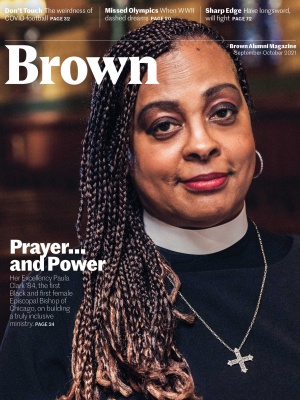In just a few weeks, the BAM staff will return to working in Providence for the first time in a year and a half. I can’t wait to see my coworkers and take some time to wander around campus. We probably won’t all be back in the office every day—we’re still working out the details—but we know we all want to be there together at least a couple of days each week. While many magazines operate on a completely remote basis, an alumni magazine is different—it’s rooted, after all, in a sense of place. There’s just no substitute for a stroll across the Green in person. And now, thanks to the reporting of Alina Kulman ’21 (see pg. 18), as I walk, I’ll be looking out for European starlings.
Alina is one of many student writing interns we’ve been lucky enough to work with and we’re incredibly grateful to all of them. Unlike us BAM staff, they have been allowed on campus during the pandemic and thus have been a lifeline for us in all matters related to campus activities and mood. They have helped us—and hopefully you, too—stay in touch with the sense of place we’ve been missing. They have also been deeply involved in some award-winning stories.
In June, we learned that BAM had once more won writing prizes from the Council for the Advancement and Support of Education’s annual Excellence Awards. Our back page (pg. 72 in most issues), a section we call Current Obsession, took bronze in the international award program. Judges called it “one of the most successful, authentic approaches we’ve seen” to highlighting voices on campus, and noted they “especially appreciated the staff’s commitment to ‘faithfully preserve the way story subjects actually speak.’”
‘Complex, compelling narratives—stories that move the needle.’
Another entry, a package of five stories that explore different aspects of racial justice, took Grand Gold—a discretionary category judges reserve for work they consider groundbreaking. The stories can all be found on our website: RaceRx, about how race and medicine intersect; Now!, featuring interviews with eight alumni in the wake of last year’s police killings and unrest; A Language, Liberated, which focuses on a linguist’s reawakening of her tribe’s Native language; Walking the Labyrinth, on a church leader who promotes racial justice through the lens of faith; and Under the Hood, in which the descendent of a Klansman uses the racial violence in his family history to probe larger truths about the U.S. Judges called the stories “a master class on writing complex, compelling narratives about racial justice—stories that move readers, and also move the needle.... As Heidi Kim says in one of the articles: ‘Whenever an old, traditional institution—like Brown, or the Episcopal Church—starts selling a narrative of inclusivity that’s still aspirational, there are going to be growing pains. There’s going to be friction. And that friction can light a spark, and create light and warmth…or it can just burn shit down.’ These stories lit sparks for these judges.” Thanks and congrats to all the writers involved, including interns Ivy Scott ’21.5 and Lauren Campbell ’21 and former intern Jack Brook ’19. We hope their work lights sparks for you, too.




